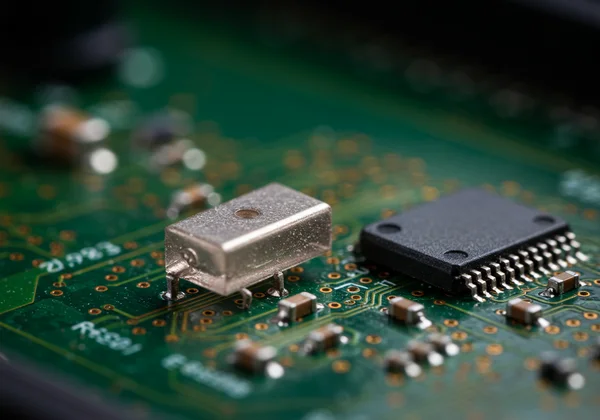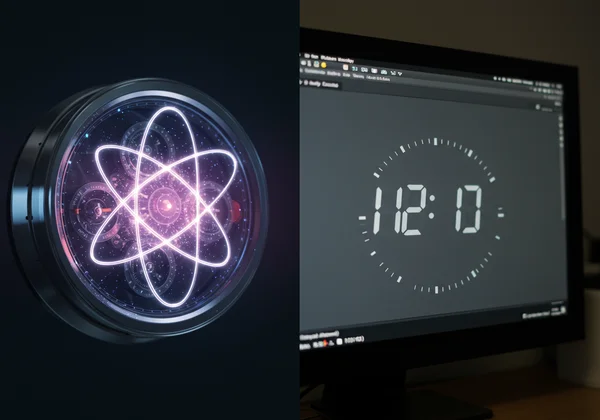Accurate Online Atomic Clock: Is Your PC's System Time Wrong?
Have you ever missed a crucial deadline by a minute, only to realize your computer's clock was lagging? Or perhaps you've joined a global video conference just a moment too late, seeing the introductory pleasantries already wrapping up. It's a common frustration that points to a hidden problem: your PC's system time is likely not as accurate as you think. This article explores why your device's clock drifts and introduces the definitive solution for precision: a true atomic clock. What is the most accurate online clock? The answer lies in technology that syncs directly with the world's most precise timekeeping standards, a level of accuracy you can experience right now with a reliable online digital clock.
Why Your Computer Clock is Often Inaccurate
We trust the time displayed in the corner of our screens for everything from scheduling meetings to timing critical operations. Yet, this reliance is often misplaced. The system clock on your Windows PC or Mac is susceptible to various inaccuracies that can compound over time, leading to significant drift. Understanding these vulnerabilities is the first step toward appreciating the need for a more reliable time source.
The Limitations of Hardware Clocks
At the heart of your computer's timekeeping is a tiny quartz crystal oscillator on the motherboard. This component vibrates at a specific frequency when electricity is applied, and the computer counts these vibrations to measure the passage of time. While ingenious, this physical mechanism is imperfect. The crystal's frequency can be affected by changes in temperature, voltage fluctuations, and even simple aging. This phenomenon, known as hardware clock drift, means that over days or weeks, your clock will inevitably run slightly faster or slower, accumulating errors that can add up to several seconds or even minutes per month.

Infrequent NTP Sync and Its Consequences
To combat hardware drift, modern operating systems use the Network Time Protocol (NTP) to periodically synchronize the system clock with an internet time server. However, these updates are not continuous. By default, Windows might only sync once every seven days. If your computer is offline during a scheduled sync, or if the connection to the server is poor, the update may fail. This infrequent NTP sync schedule leaves long windows of opportunity for your hardware clock to drift away from the true time, making it an unreliable source for tasks that demand precision. For moments when accuracy can't wait, a realtime clock offers a superior alternative.
Regional Differences & Daylight Saving Headaches
Time zone settings and Daylight Saving Time (DST) add another layer of complexity and potential error. Operating systems rely on a database of regional time rules, but these can become outdated if your system isn't regularly updated. A delayed DST transition or an incorrect time zone setting can throw your clock off by an entire hour. This is a common source of confusion, especially for those coordinating across different regions. Manually adjusting the clock can fix the immediate issue but disrupts the delicate synchronization process, often making long-term accuracy even worse.
Atomic Time vs. Your System Clock: The Core Difference
The discrepancy between your PC's time and the actual time stems from the fundamental difference in their reference points. Your computer relies on a flawed local oscillator with occasional corrections. In contrast, a true atomic clock vs system time comparison reveals a vast gulf in precision, as one is based on a universal constant while the other is a simple estimation.

What Exactly is Atomic Time?
Atomic time is the most accurate timekeeping standard known to humanity. It is based on the incredibly consistent and predictable electromagnetic oscillations of cesium-133 atoms. Scientists measure the 9,192,631,770 vibrations that occur every second to define the second itself. This time standard is so stable that an atomic clock would only gain or lose one second over millions of years. This forms the basis for Coordinated Universal Time (UTC), the international standard by which the world regulates clocks and time.
How Online Clocks Sync with Atomic Servers
A high-quality online clock, like our service, bypasses your computer's flawed system time entirely. Instead of relying on your local hardware, it directly and frequently communicates with a network of atomic servers. These servers are synchronized with national time laboratories that maintain physical atomic clocks. By constantly pinging these authoritative sources, an online tool provides a live, hyper-accurate time display that reflects the true UTC, adjusted for your selected time zone. This ensures you are always operating on the most precise time possible.

The Unrivaled Benefits of an Accurate Online Clock
Switching from your unreliable system clock to an accurate online clock is more than just a minor upgrade—it's a fundamental shift toward reliability and professionalism. Whether you are a project manager coordinating international teams, a lecturer keeping an exam on schedule, or a designer perfecting a workflow, the benefits are immediate and substantial.
Precision for Professional and Critical Applications
For many professionals, precision is not a luxury; it's a requirement. In fields like finance, a few seconds can mean the difference in executing a trade. For IT administrators analyzing server logs, timestamp accuracy is crucial for security and debugging. Global project managers like Elena depend on exact timing to ensure seamless collaboration across continents. Relying on an online atomic clock ensures that all critical applications are benchmarked against a trustworthy and verifiable time source, eliminating ambiguity and fostering confidence.
Avoiding Discrepancies in Global Coordination
When working with teams spread across San Francisco, Berlin, and Singapore, a shared understanding of time is paramount. A simple instruction like "Let's sync up at 9:00 AM" can create chaos if everyone's clock is slightly different. Using a synchronized global coordination tool ensures every team member is looking at the same, accurate time. An online world time zone clock not only provides precision but also makes it easy to manage multiple time zones, preventing miscommunication and keeping projects on track.

Instant Access, No Software Needed
One of the greatest advantages of an online clock is its accessibility. There is no software to install, no system settings to configure, and no administrative permissions required. It's a powerful online solution that works instantly in any modern web browser on any device. This means you can have an ultra-accurate clock running in a fullscreen display for a presentation, or as a persistent tab on your desktop, without any technical overhead. It's the simplest way to access a truly free online clock that delivers professional-grade accuracy.
Stop Guessing: Embrace Precision with an Online Atomic Clock
Your computer's clock is an approximation, a useful but ultimately flawed tool that drifts and falters. In a world where every second counts, relying on an imprecise instrument is a risk you don't need to take. By understanding its limitations and embracing the superior accuracy of atomic time, you can elevate your efficiency, professionalism, and reliability.
Stop letting a drifting system clock dictate your schedule. Experience the confidence that comes with perfect timing. Visit DigitalClock.org today to access a free, hyper-accurate, and fully customizable clock that syncs directly with the world's most precise timekeepers.
Frequently Asked Questions About Online Clock Accuracy
How accurate is an online digital clock?
The accuracy of an online digital clock depends entirely on its source. A basic clock widget might just reflect your inaccurate system time. However, a professional service like this platform syncs directly with NTP servers tied to atomic clocks, offering accuracy down to the millisecond. This far exceeds the reliability of any standard computer clock.
What is the most accurate online clock?
The most accurate online clock is one that explicitly states it synchronizes with atomic time servers. These clocks bypass your local system's errors and provide a direct feed from the global time standard, UTC. For a reliable and precise timekeeping experience, you can try our free tool today.
How does an online clock sync with atomic time?
An online clock doesn't have a direct physical connection to an atomic clock. Instead, it uses the Network Time Protocol (NTP) to send and receive data packets from a global network of time servers. These servers are themselves synchronized with national standards institutes that operate atomic clocks. By measuring the round-trip time of these packets, the online clock can accurately calculate and display the precise time.
What is the difference between NTP and local system time?
NTP is a protocol, a set of rules used to synchronize clocks over a network. Your local system time is the result of that process (or lack thereof). While your OS uses NTP to occasionally correct your clock, a dedicated online atomic clock uses it continuously to provide a live, hyper-accurate time feed, effectively bypassing the inaccuracies and drift inherent in your local hardware.